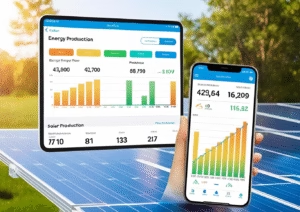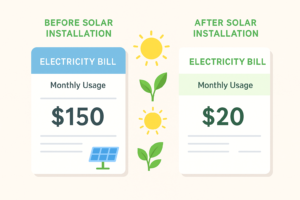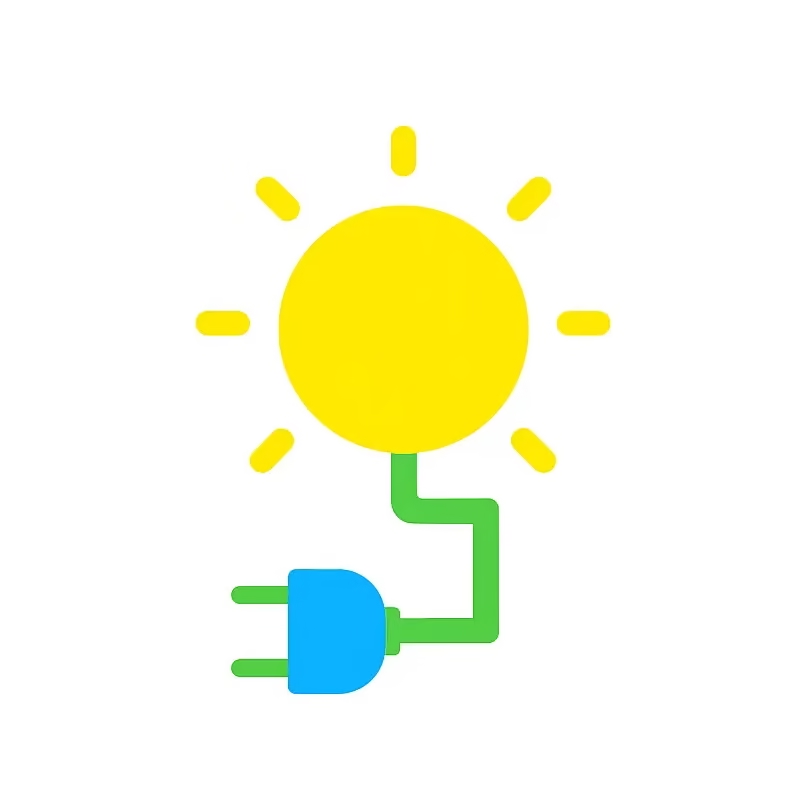Title
How to Know If Your Solar Panels Are Working Effectively( 5 Ways) and Ensure Your Solar Panels Working Properly
Solar panels harness sunlight, converting it into renewable energy that can power homes and businesses. This guide will help you understand the importance of checking your solar panels to maximize their efficiency, ensuring they are always working at their best.
Description
Learn how solar panels work and how to ensure they’re functioning properly for maximum efficiency.
Final Thoughts on Ensuring Your Solar Panels Are Working
In conclusion, understanding the functionality of your solar panels and regularly checking their performance is vital. By taking proactive steps, you can ensure your investment pays off, allowing you to enjoy clean, renewable energy for years to come. Remember, a solar system that is consistently monitored and maintained will provide not only energy savings but also peace of mind. Trust in your solar panels working is essential for a sustainable future.
Future Trends in Solar Panel Technology
The solar industry is continuously evolving with advancements in technology. Innovations such as solar shingles and more efficient photovoltaic materials promise to enhance energy production. Staying updated on these trends can help you make informed decisions regarding upgrades and maintenance.
Understanding Energy Credits and Net Metering
If you produce more energy than you consume, many utility companies offer energy credits through net metering. Understanding how this system works can help you maximize the financial benefits of your solar installation. It’s essential to stay informed about your local net metering policies to take full advantage.
Real-Life Examples of Solar Panel Efficiency
Many homeowners have reported significant reductions in their energy bills after installing solar panels. For instance, a family in California noted a 70% decrease in their monthly electricity costs during the summer months. Such examples illustrate the tangible benefits that come from ensuring your solar panels are working effectively.
Tips for Maintaining Your Solar Panels
Routine maintenance can significantly enhance the longevity and performance of your solar panels. Regularly cleaning the panels to remove dirt and debris is essential, as buildup can reduce their efficiency. Additionally, scheduling periodic inspections by a professional can help identify potential issues before they escalate.
The Role of Inverters in Solar Energy Systems
Inverters are a crucial part of your solar power system. They not only convert DC electricity to AC, but they also ensure that the energy produced is usable in your home. Modern inverters come with additional features such as monitoring capabilities that can help you track the performance of your system in real-time.
Understanding Solar Panel Technology
Solar technology has come a long way since its inception. The modern solar panel consists of layers of photovoltaic cells arranged to absorb sunlight effectively. The materials used, such as silicon, are chosen for their efficiency in converting solar energy into usable electricity. Understanding these components can help you appreciate the technology and its benefits.
How Do You Know That Your Solar Panels Are Working? (5 Easy Ways to Check Today)
Are you wondering how do you know that your solar panels are working properly?
You’re not alone — many new solar owners ask the same question. The good news is, it’s not difficult to check. With just a few quick steps, you can easily tell if your system is generating power and saving you money.
In this expert-backed beginner’s guide, we’ll show you exactly how solar panels work and how to make sure they’re doing their job.

Step 1: Understand How Solar Panels Work Behind the Scenes
Before you check your system’s performance, it helps to understand the basics:
1. Sunlight Hits Your Solar Panels
Solar panels are made of photovoltaic (PV) cells that absorb sunlight and convert it into direct current (DC) electricity.
2. The Inverter Converts DC to AC
Your solar inverter transforms DC electricity into alternating current (AC) — which is what your appliances use.
3. Power Feeds Your Home or the Grid
That AC power either powers your home or is exported to the grid — especially if you have net metering, which lets you earn credits for surplus energy.
Step 2: 5 Proven Ways to Know That Your Solar Panels Are Working
Here are five simple methods to verify your solar panel performance:
1. Check the Inverter Light
Your inverter has an LED light:
-
Green = everything’s working fine
- Red or orange = system fault
Tip: Check your inverter during sunny daytime hours when panels should be actively producing power.

2. Use Your Solar Monitoring App
Most solar systems include a mobile or web app. Use it to:
- Track daily energy output
- Monitor performance trends
- Spot unusual drops or error alerts
Look for spikes or drops in performance. If it suddenly shows zero production on a sunny day, something’s wrong.

3. Compare Your Electricity Bills
Working panels will result in:
-
Lower monthly bills, or
-
Credits from your utility provider (if on a net metering plan)
Track your bill over time. A sudden increase may suggest a panel issue.

4. Test with a Multimeter (Advanced Users)
f you’re comfortable with electrical tools, use a DC multimeter to check voltage output directly at the panels.
Safety First: If you’re unsure how to handle a multimeter, consult a technician.
5. Observe Home Behavior & Weather Patterns
Your system should react to sunlight naturally:
- Cloudy days = less power
- Sunny days = more power
- Lights flickering = possible system fault
Common Signs Your Solar Panels Are Not Working
- Inverter shows a red warning light
- App reports zero or low production
- Sudden increases in utility bills
- Error codes or alerts in your app
Bonus Tip: Set a Monthly Solar Checkup Reminder
Just like a car, your solar system benefits from routine check-ins:
-
Check your monitoring app weekly
-
Glance at your inverter monthly
-
Clean debris off panels every season
Final Thoughts: Trust the Sun — But Stay Proactive
So, how do you know that your solar panels are working? By combining app data, visual checks, electricity bills, and simple awareness, you can confirm your solar system’s health — and ensure it’s saving you money.
Stay energy smart. A well-performing solar system means clean, free power every day.
